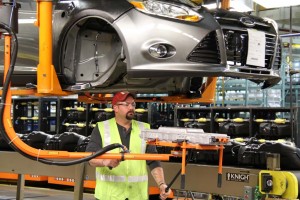
Ford plans to rapidly increase the number of battery vehicles in its line-up and boost production capacity while also driving down costs.
Ford Motor Co., despite the feeble growth of sales of hybrids and electric vehicles, has no intention of backing off its ambitious plans to build more electric vehicles. Instead, the automaker has announced plans to invest another $135 million to design, engineer and test future battery-based vehicles.
Joe Bakaj, Ford vice president of powertrain engineering, said the investment will include hiring more engineers to work on electric vehicle projects alongside the 1,000 experts it already has working on EV projects at its engineering campus in Dearborn at what the company is now calling the Advanced Electrification Center. Ford continues to build its electrified team having hired 60 engineers in the past year with plans to fill more positions in the next few months.
While the price of gasoline continues to fluctuate, the long-term trend in fuel prices is upwards and consumers around the world are demanding greater fuel efficiency, Bakaj said. “Sixty percent of our customers say they would consider a hybrid if the price was equal to a vehicle with an internal combustion engine,” he said.
The Detroit maker is not alone. It recognizes key competitors like Toyota are pushing into battery technology at an accelerating pace. The Japanese maker’s Lexus brand alone expects to have at least eight hybrids in its global portfolio by mid-decade and the mainstream Toyota brand has just launched both a new plug-in hybrid and a new battery car, the RAV4-EV.
Ford’s objective is not only to develop more electrified vehicles, however, but also to reduce the price of the technology, Bakaj said.
Ford also plans to double its battery-testing capabilities and speed up the pace of development of electrified vehicles by at least 25%, creating even more fuel-efficient choices for customers.
“The good news for customers is that they not only have more choice, but they have faster access to Ford’s latest and greatest in fuel-saving technologies and vehicles,” Bakaj said. “This stems directly from our decisions to deliver true power of choice by expanding our dedicated electrified vehicle team and further investing in our facilities.”
The U.S. Department of Energy has supplied the financing for the EV project but Bakaj was careful to note the company’s analysis of current market demand and future trends would have pushed Ford to make the investment on its own.
The continuing investments have already helped reduce the cost of Ford’s current hybrid system by 30% versus the company’s previous-generation technology.
Overall, Ford this year is introducing five electrified vehicles, including an all-electric version of the popular Ford Focus, priced at $40,000. The maker expects to triple electrified vehicle production capacity by 2013, Bakaj said.
Ford also has spent $220 million to modernize the company’s Van Dyke transmission plant in the Detroit suburb of Sterling Heights to build hybrid transmission as well as other fuel-efficient transmissions. To handle that expanded production the company is hiring 225 new employees to staff the plant.
The new hybrid transmission, which incorporates two electric motors, is the first hybrid transmission to be designed and built by Ford. Previously, hybrid transmission production was done by a supplier in Japan. By bringing the development work in-house, Ford reduced development costs 20%.
“Our investments in Van Dyke Transmission make it our most advanced, efficient transmission plant in the world,” said Jim Tetreault, vice president of North America Manufacturing. “This demonstrates our commitment to bringing jobs and technology back into Ford and North America – actions that not only benefit our employees but our customers and the communities where we do business.”
